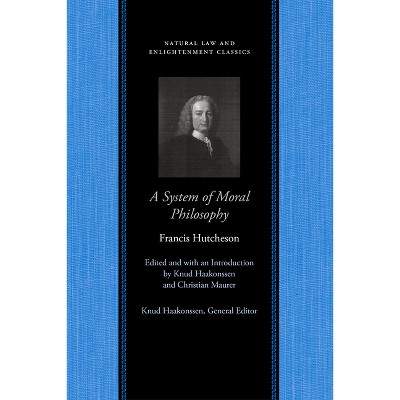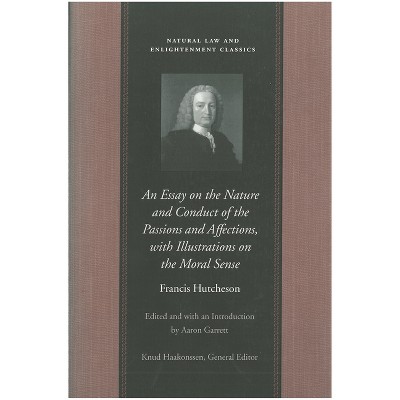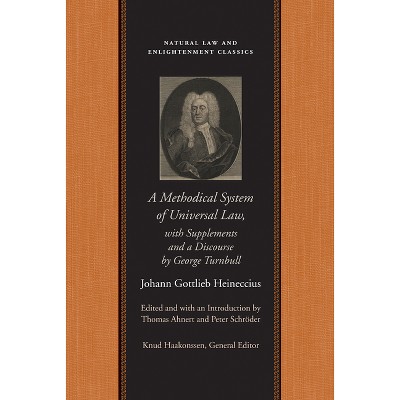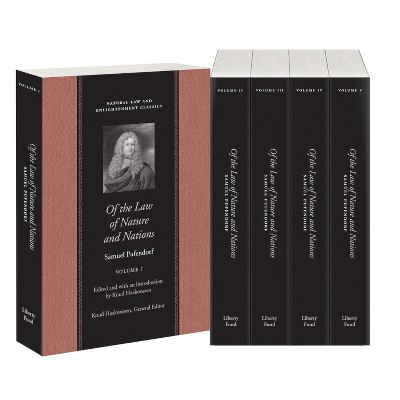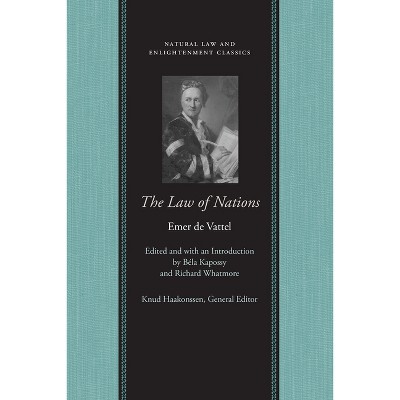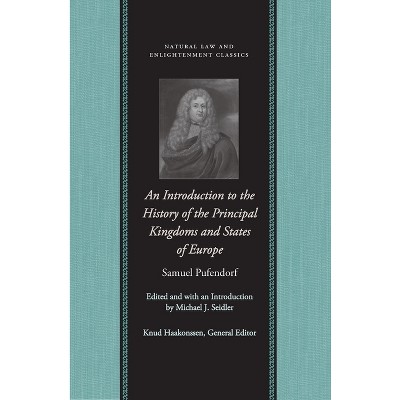Sponsored

The Principles of Moral and Christian Philosophy - (Natural Law and Enlightenment Classics) by George Turnbull (Hardcover)
In Stock
Sponsored
About this item
Highlights
- The Principles of Moral and Christian Philosophy presents the first masterpiece of Scottish Common Sense philosophy.
- Author(s): George Turnbull
- 984 Pages
- Religion + Beliefs, Christian Theology
- Series Name: Natural Law and Enlightenment Classics
Description
Book Synopsis
The Principles of Moral and Christian Philosophy presents the first masterpiece of Scottish Common Sense philosophy. This two-volume treatise is important for its wide range of insights about the nature of the human mind, the foundations of morals, and the relationship between morality and religion.
The first volume presents a detailed study of the faculties of the human mind and their interrelations. The second volume presents arguments for the existence of God and for God's infinite perfection. The underlying notion is God's moral government of the world, in which there is recompense for good and evil deeds.
George Turnbull (1698-1748) taught at Marischal College, Aberdeen.
Alexander Broadie is Professor of Logic and Rhetoric at the University of Glasgow.
Review Quotes
Two hundred and sixty-five years after its first and only publication, Turnbull's Principles returns in a handsomely produced two-volume set as part of a series "Natural Law and Enlightenment Classics." Born in 1698, Turnbull was four years junior to Francis Hutcheson, whom he largely resembles, partly through a mutual dependence on Shaftesbury-Turnbull was by 1716 or 1717 a member of Edinburgh's Rankenian Club, devoted to the discussion of Shaftesbury's ideas-and partly through direct influence: Turnbull acknowledges a debt to Hutcheson (whose first work appeared in 1725), "the writer from whom I have borrowed most." Turnbull developed his philosophy in 1721-1727 as a regent at Marischal College, Aberdeen, where he was, Mr. Broadie notes in his Introduction, "the first of a long line of Scottish moralists to speak explicitly about the introduction of the experimental method of reasoning into moral subjects." Leaving Scotland in 1727 and ordained in the Church of England in 1739, Turnbull spent much of his remaining twenty-one years as a private tutor to young gentlemen on the grand tour.
Turnbull's Principles seeks to ground moral philosophy on principles of natural religion. Invoking the authority of Shaftesbury and the ancient Stoics (Plutarch, Seneca, and above all Cicero), he argues with a confidence none of them shared that the immortality of the virtuous soul is "highly probable, nay, absolutely certain." The "better ancients. . .had a very firm persuasion of an infinitely wise and good administration, actually prevailing at present throughout the whole of nature. . .They were able to discern...that man is very well fitted and qualified for attaining to a very high degree of moral perfection even here." Turnbull works within the classical virtue-ethics revived by Shaftesbury, a type of ethical theory that asks, what behavior would perfect the sort of being I am? Turnbull argues-never very clearly or persuasively-that such an ethics implies that our "moral perfection must be arrived to full maturity" in a future state. Differently stated, the moral fact that virtue is its own reward on earth shows "providence to be already most seriously concerned about her, and thoroughly interested on her side in her first probationary state," a state which then becomes prognostic for "a succeeding life."
Turnbull's Principles consists of two separate volumes, the first and most interesting being Principles of Moral Philosophy, the themes of which are amplified in volume two, Christian Philosophy. This later volume has little to do with Christian doctrine, which is adduced only insofar as it conforms to the "doctrine of reason." Principles of Moral Philosophy is largely and by design a prose explication and elaboration of Pope's Essay on Man. One of the volume's two epigraphs (the other is from Newton) is from I.162: "Account for Moral, as for Nat'ral Things." His Preface praises Pope's Essay-recently defended by Warburton-over two pages, concluding, "such a poet, indeed, deserves the ancient venerable name so justly appropriated to poets," "divinus." In all, by my count, Turnbull quotes 463 lines from Pope's Essay, or 35% of the poem. Turnbull's professed aim is "to vindicate human nature, and the ways of GOD to man." He follows Pope in accounting for a cosmos in which certain relative evils are necessary to the greater absolute good; in which the passions are a valuable part of our moral constitution; in which self-love and social are the same; and, finally, in which virtue alone is happiness below and-Turnbull emphasizes as Pope does not-above as well.
The Scriblerian
Autumn 2006
It is commonplace that David Hume set out in his Treatise of Human Nature to become "the Newton of the moral sciences." However, nowhere in the Treatise did he refer to Newton, and it was only in an appendix that he discussed the Newtonian philosophy--in connection with his claim that we have no genuine idea of absolute space. In the introduction to the Treatise, Hume identified Bacon rather than Newton as "the father of experimental physics," and he regarded himself as following the lead of Locke and others in applying the experimental method to moral subjects. There is reason to think that Hume would not have considered himself to be the Newton of the moral sciences. Unlike his contemporary George Turnbull, Hume conceived of a very different relation between the natural and moral sciences than did Newton himself.
Turnbull advocated the use of the Newtonian method in moral philosophy from his earliest publications of 1723 and 1726, when he was regent at Marischal College and teacher of the young Thomas Reid. The motto on the title page of the first volume of his Principles of Moral and Christian Philosophy (published in 1740, the same year as Book 3 of Hume's Treatise) is from Newton's Optics, where Newton wrote that if natural philosophy is perfected through his method "the Bounds of Moral Philosophy will also be enlarged" (1:1). Turnbull took seriously Newton's own understanding of the relation between natural and moral philosophy, that it is by teaching us about "the first Cause. . .and what Benefits we receive from him" that natural philosophy will lead us to understand "our Duty towards him, as well as that towards one another." In his preface to The Principles of Moral Philosophy(i.e., volume 1 of The Principles of Moral and Christian Philosophy), Turnbull makes it clear that by extending the experimental method to the human mind he was adopting Newton's belief in a Divine Providence and was arguing that the same wisdom prevails in the moral as in the physical sphere (1:8-9). Moral philosophy or philosophy of mind is not for Turnbull a foundation for the other sciences; as suggested by Newton, it is an extension and completion of it.
Alexander Broadie's edition of this work, the most comprehensive statement of Turnbull's philosophy, is a welcome addition to the Liberty Fund series of Natural Law and Enlightenment Classics. Broadie has written illuminating introductions to each of the two volumes of the Principles. In the introduction to volume 1, he stresses Turnbull's doctrine of liberty, according to which laws of nature are a condition for, rather than an impediment to, our free will (xv-xvi). According to Turnbull, it is only by understanding the general laws governing ourselves, as well as those governing corporeal nature, that we are able to guide our actions toward our own moral improvement. Broadie stresses the relation of Turnbull's writing to that of other major thinkers of the day to whom he frequently refers, including Shaftesbury, Hutcheson, Pope, Berkeley, and Butler.
In his introduction to volume 2, Christian Philosophy, Broadie argues that Turnbull is presenting a work in rational rather than revealed religion, in spite of the fact that he is here concerned with the relationship between this world and the next (xiii and following). Turnbull begins by presenting a rational proof of a good and wise deity and then goes on to argue that the creation only appears to us to contain evil because of our partial perspective. The laws of human nature are so constituted that we can use any situation that we find ourselves in to improve our moral character.
In addition to his introductions to each volume, Broadie supplies translations throughout for Turnbull's frequent footnote quotations from Roman and Greek writers. These are supplemented by the editor's own notes, which are most useful in identifying Turnbull's sources in readily accessible contemporary editions. The editorial principles are sound and easy to understand.
Eighteenth-Century Scotland
Spring 2006
Turnbull (1698-1748) was the first in a long line of Scottish moralists to speak explicitly about introducing the experimental method of reasoning into moral subjects. The two volumes he published in 1740 were titled respectively Principles of Moral Philosophy and Christian Philosophy. For this edition of them, Broadie (logic and rhetoric, U. of Glasgow) has made few changes, correcting manifest printer's errors but not modernizing Turnbull's 18th-century spelling or correcting what may be spelling mistakes. He has silently incorporated the original list of errata into the text. His own notes are distinguished from the original notes. The two volumes are paged and indexed together.
Reference & Research Book News
August 2005











